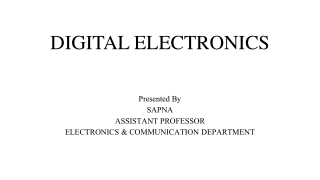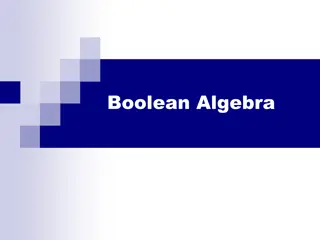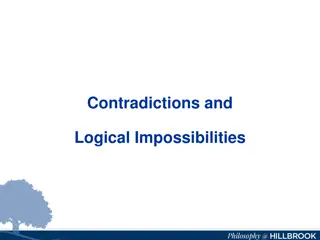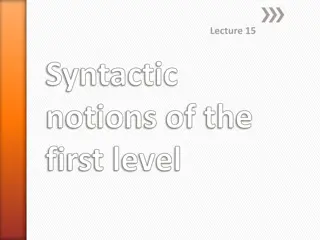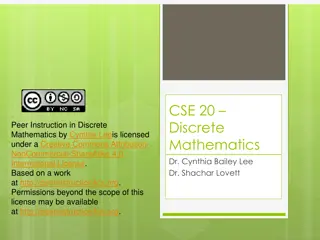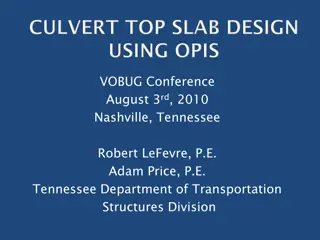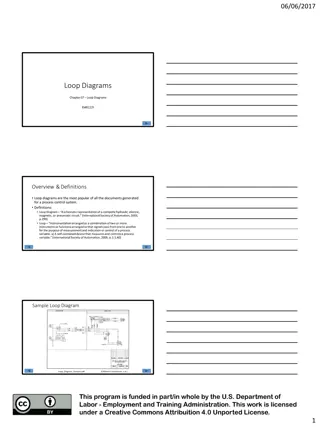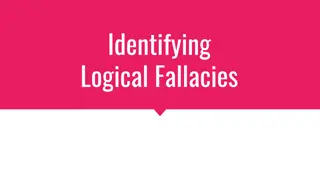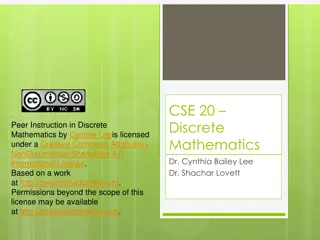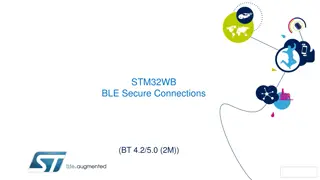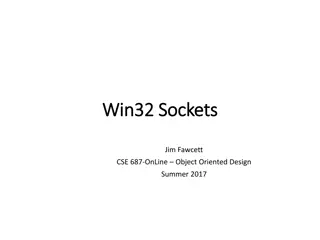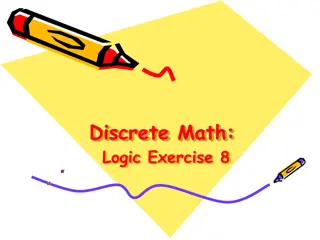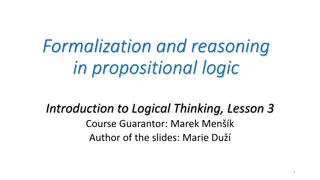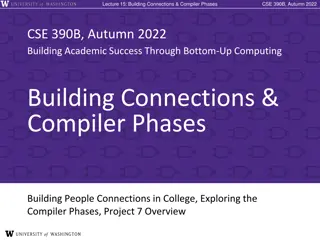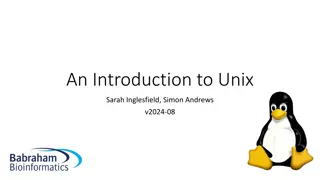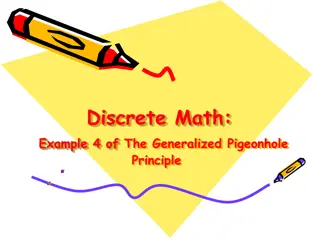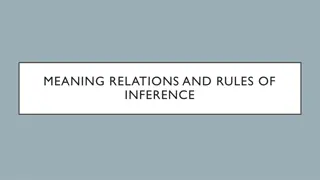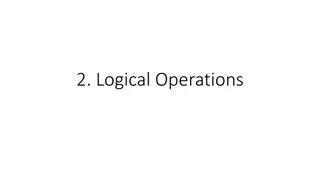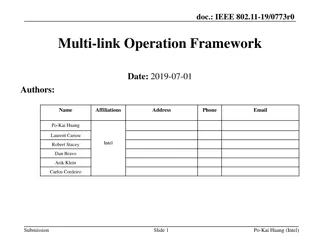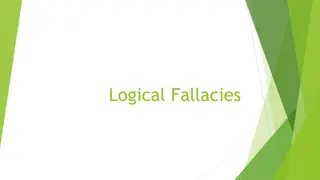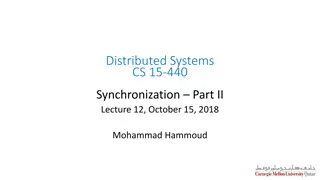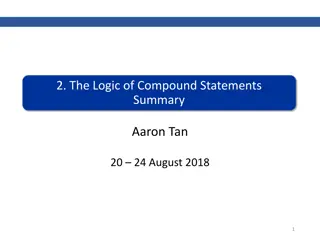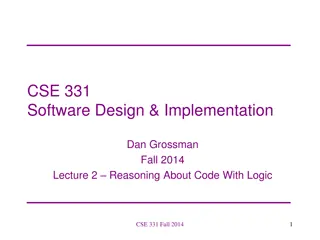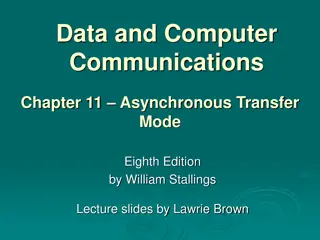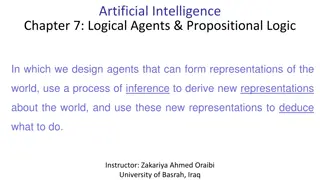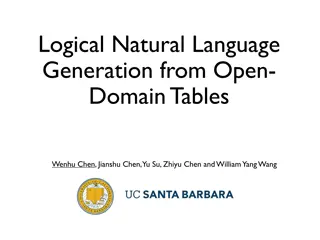Why You Need to Buy LinkedIn Connections
In the competitive landscape of professional networking, LinkedIn stands out as the premier platform for building meaningful connections, fostering professional relationships, and expanding your career opportunities. With millions of users worldwide, LinkedIn offers a vast network of professionals a
4 views • 2 slides
DIGITAL ELECTRONICS
Introduction to digital electronics covering binary digits, logic levels, boolean algebra, logical operators (AND, OR, NOT), laws of boolean algebra, and operations like logical multiplication and addition. Learn about the fundamental concepts essential for understanding digital circuits and operati
0 views • 67 slides
Understanding Logical Form and Equivalence in Conditional Statements
Delve into the intricacies of logical form, equivalence, and compound statements in the realm of propositional logic. Explore valid and invalid arguments, conditional statements, and the logic of compound statements with puzzles to sharpen your logical reasoning skills. Unravel scenarios like determ
2 views • 81 slides
Best New Connections in Ravensdale
Are you looking for the Best New Connections in Ravensdale? Then contact Charlton Power Pty Ltd. They specialise in providing top-notch electrical solutions for residential, commercial, and industrial clients. From switchboard upgrades and private pole installation to new connections their skilled t
0 views • 6 slides
Logical Expressions and Symbolism in Sentential Logic
Understanding sentential logic, logical expressions, and symbols through examples of logical reasoning and inference. Explore the concepts of logical OR, AND, negation, and the complexities of inclusive and exclusive logic in various scenarios.
1 views • 33 slides
Understanding Boolean Algebra and Logical Statements
Introduction to Boolean algebra, logical statements, and compound statements. Explore the concepts of Boolean variables, logical operators, writing conventions, equivalence in Boolean algebra, and truth tables. Learn how to analyze and evaluate logical expressions using truth tables.
1 views • 25 slides
Exploring Contradictions and Logical Impossibilities
Explore a series of paradoxes and logical puzzles, ranging from being in two places at once to time travel conundrums. Discover the concept of contradictions and logical impossibilities through thought-provoking scenarios and riddles. Dive into the realm of impossibilities and challenge your underst
1 views • 6 slides
Syntactic Notions of the First Level in Linguistics
In this lecture, the syntactic notions of the first level in linguistics are discussed, focusing on word groups, simple sentences, and the essential features of actual division. The different types of syntagmatic groupings of words, such as notional words, functional words, and their combinations, a
1 views • 19 slides
Enhancing Logical Reasoning in Decision Making Process
Federal Criterion #28 emphasizes the importance of stating logical reasons for decisions that align with findings of fact and conclusions of law. This criterion is key to ensuring fairness and accuracy in legal analysis. The scoring criteria, national appeals review results, and ways to improve scor
1 views • 8 slides
Understanding Boolean Algebra and Logical Statements
Boolean Algebra allows for formalizing logical reasoning using variables that can be either true or false. It involves logical statements, compound expressions, logical operators like AND, OR, NOT, writing conventions, equivalence, and truth tables to determine the truth values of statements. By und
0 views • 25 slides
Understanding Logical Connectives in Discrete Mathematics
Explore the world of propositional logic and truth tables in discrete mathematics through a peer-instruction approach. Learn about basic logical connectives, new connectives, complex formulas, operator precedence, and the nuances of implication (implies) with engaging examples. Delve into scenarios
0 views • 14 slides
Modern Culvert Design Innovations in Tennessee's Transportation Infrastructure
Explore the evolution of culvert design in Tennessee, from the shift from moment connections to shear connections, adoption of AASHTO standards for federal funding compliance, and the utilization of pinned connections for efficient design and modeling in Opis and Excel spreadsheets.
4 views • 71 slides
Understanding Propositional Logic and Logical Operators
Learn about propositional logic, statements, logic operators, compound statements, exclusive-or, logical equivalence, and writing logical formulas for truth tables. Explore how to create compound statements for exclusive-or using different approaches and ensure logical equivalence. Enhance your know
0 views • 26 slides
Understanding Logical Relations in Programming Languages
Explore the concept of logical relations in programming languages, focusing on the relation between high-level and low-level programs. Learn about contextual equivalence, its benefits and limitations, and how logical relations offer a robust framework for defining program equivalence. Discover why l
0 views • 18 slides
Understanding Laws of Logic and Logical Reasoning
Laws of logic play a crucial role in reasoning and making deductions. This comprehensive guide explains the use of contrapositives, examples of conditional statements, and the significance of laws like the Law of Syllogism. Understanding these principles helps in effectively analyzing statements and
0 views • 8 slides
Introduction to Symbolic Logic: Understanding Logical Inferences
Logic is the study of reasoning methods to distinguish between correct and incorrect arguments. Symbolic Logic involves representing logic symbolically for easier understanding and manipulation. Logical inferences help in making decisions based on reasoning chains. The content discusses the use of l
1 views • 28 slides
Overview of Loop Diagrams in Process Control Systems
Loop diagrams are essential documents in process control systems, providing schematic representations of hydraulic, electric, magnetic, or pneumatic circuits. They detail instrumentation arrangements, signal connections, power connections, and termination information. Guidelines and standards for cr
1 views • 5 slides
Identifying Logical Fallacies in Sources: Presentation Assignment
Learn to identify logical fallacies in various sources by analyzing passages and applying the Logical Fallacy Referee tool. Work in pairs to select sources, identify fallacies, and present annotated examples to the class.
0 views • 7 slides
Peer Instruction in Discrete Mathematics
Explore the world of discrete mathematics with Dr. Cynthia Bailey Lee and Dr. Shachar Lovett through peer instruction. Dive into topics like step-by-step equivalence proofs and the equivalence of logical operators. Discover the different methods to show propositions are equivalent and delve into log
0 views • 14 slides
STM32WB BLE Secure Connections Overview
This detailed content provides insights into the secure connections in STM32WB BLE devices, covering aspects such as BLE security methods, encryption techniques, pairing processes, key distribution, and security modes and levels. It emphasizes the use of Long Term Keys (LTK), Diffie-Hellman key exch
0 views • 12 slides
Understanding Sockets: A Comprehensive Overview
Sockets provide a standard interface for network protocols like TCP/IP, enabling connections between machines to send and receive data. The TCP protocol, part of the TCP/IP suite, is crucial for internet communications. Learn about the logical structure of sockets and how to create socket connection
0 views • 37 slides
Propositions and Logical Connectives Exercise Solutions
In this exercise, propositions involving grizzly bears, hiking safety, and ripe berries are formulated using logical connectives. Solutions are provided for various scenarios including conjunctions, conditionals, biconditionals, and more. The explanations offer a structured approach to understanding
0 views • 6 slides
Introduction to Propositional Logic: Formalization and Reasoning
Understanding formalization in propositional logic involves replacing atomic propositions with propositional variables and natural language connectives with logical connectives. The process abstracts from internal proposition structure, reducing meaning to True or False. The language allows formaliz
0 views • 18 slides
Building Connections and Compiler Phases in College: Networking Strategies
Discover the benefits of building connections in college through networking strategies like reaching out to professors, TAs, and peers. Learn the importance of networking, ways to get involved on campus, and how to leverage your connections for personal and academic growth.
0 views • 39 slides
Building Friendships Where You Live: Pathways to Inclusive Connections
Understanding the importance of community connections for people with disabilities, this resource promotes friendship beyond typical relationships. It explores the benefits of friendships, strategies for meaningful connections, and the impact of support in fostering friendships regardless of locatio
0 views • 20 slides
The Logical Structure of Classical and Quantum Mechanics
The paper explores the common logical structure shared between classical and quantum mechanics, emphasizing the non-distributive lattice embedded in a distributive one. It discusses how all physical theories must adhere to this structure, incorporating topology, Heyting algebra, Boolean algebra, and
1 views • 36 slides
Understanding Unix: Fundamentals and Connections
Explore the basics of Unix operating systems, terminology, types of Linux installations, and connecting to remote Linux machines. Learn about key concepts such as local vs. remote connections, SSH connections using passwords and keys, and tools like PuTTY for remote access.
0 views • 78 slides
Introduction to Logical Thinking in Computer Science at VSB - Technical University of Ostrava
This course introduces the concept of logical thinking in Computer Science at VSB - Technical University of Ostrava. Topics include valid arguments, deductive reasoning, and the science of correct reasoning. Requirements for passing the course include written tests and exams with specified grade ran
0 views • 18 slides
Minimum Direct Connections to Achieve Simultaneous Access
In a computer science laboratory with 15 workstations and 10 servers, the minimum number of direct connections needed to ensure that any set of 10 or fewer workstations can simultaneously access different servers is determined using the Generalized Pigeonhole Principle. By strategically connecting w
0 views • 5 slides
Understanding Meaning, Relations, and Rules of Inference in Logic
Exploring the concept of meaning, relations, and rules of inference in logic through the use of truth tables to evaluate logical formulas. Discover how tautologies and contradictions are identified, and how logical operators influence the truth values of propositions. Delve into examples that showca
0 views • 24 slides
Understanding Logical Operations and Their Applications
Logical operators such as AND, OR, NOT, and XOR play a crucial role in programming and control systems. They are used to combine logical expressions and make decisions based on certain conditions. By utilizing truth tables, these operators help in solving problems efficiently. This article explores
0 views • 24 slides
IEEE 802.11-19/0773r0 Multi-link Operation Framework Summary
The document discusses the multi-link operation framework for IEEE 802.11-19/0773r0, focusing on load balancing and aggregation use cases. It introduces terminology related to multi-link logical entities and provides examples of multi-link AP and non-AP logical entities. The framework considers stee
0 views • 16 slides
Understanding Logical Fallacies: Common Types and Examples
Logical fallacies are errors in reasoning that can undermine the validity of arguments. This content covers various types of fallacies such as circular logic, either/or fallacy, oversimplification, overgeneralization, stereotyping, and ad hominem attacks. Examples and explanations are provided for e
0 views • 16 slides
Understanding Distributed System Synchronization and Logical Clocks
Continuing from the previous lecture on time synchronization, this session delved into logical clock synchronization, mutual exclusion, and election algorithms in distributed systems. Logical clocks, such as Lamport's Clock and Vector Clock, play a crucial role in defining the order of events withou
0 views • 33 slides
Understanding Compound Statements in Logic
The summary discusses the logic of compound statements, covering logical form, equivalence, tautologies, contradictions, conditional statements, valid and invalid arguments, and more. It explains the definitions of statements, negation, conjunction, disjunction, statement form, logical equivalence,
0 views • 12 slides
Logical Reasoning in Software Design and Implementation
Logical reasoning in software development involves determining the truth of facts as a program runs under specific assumptions. This process complements testing by allowing programmers to reason about classes of inputs/states and verify program correctness. Hoare Logic is introduced as a method for
0 views • 35 slides
Understanding Asynchronous Transfer Mode (ATM) in Data and Computer Communications
Asynchronous Transfer Mode (ATM) is a packet transfer technology that supports multiple logical connections over a single physical interface. It uses fixed-sized packets called cells for data transfer. ATM bears similarities to packet switching and offers streamlined packet transfer with minimal err
0 views • 46 slides
Understanding Logical Agents and Propositional Logic in AI
Designing logical agents involves forming representations of the world, using inference for deriving new insights, and deducing actions based on these representations. Knowledge Base (KB) is a crucial component, comprising known facts and current percepts to infer hidden states. Propositional logic,
0 views • 23 slides
Introduction to Logical Thinking: Science of Correct Reasoning
Logic, the science of correct reasoning, explores ways to infer conclusions from assumptions and validate arguments. This course introduces logic as a tool for analyzing arguments, automating processes, and enhancing communication clarity. Through classic logic variants like propositional and predic
0 views • 30 slides
Advancements in Logical Natural Language Generation from Open-Domain Tables
Cutting-edge research in logical natural language generation (NLG) is transforming the field by moving beyond traditional surface realization to generate summarized text, conclude trends, and apply logical and mathematical operations. By addressing limitations such as lack of logical inference, summ
0 views • 33 slides

